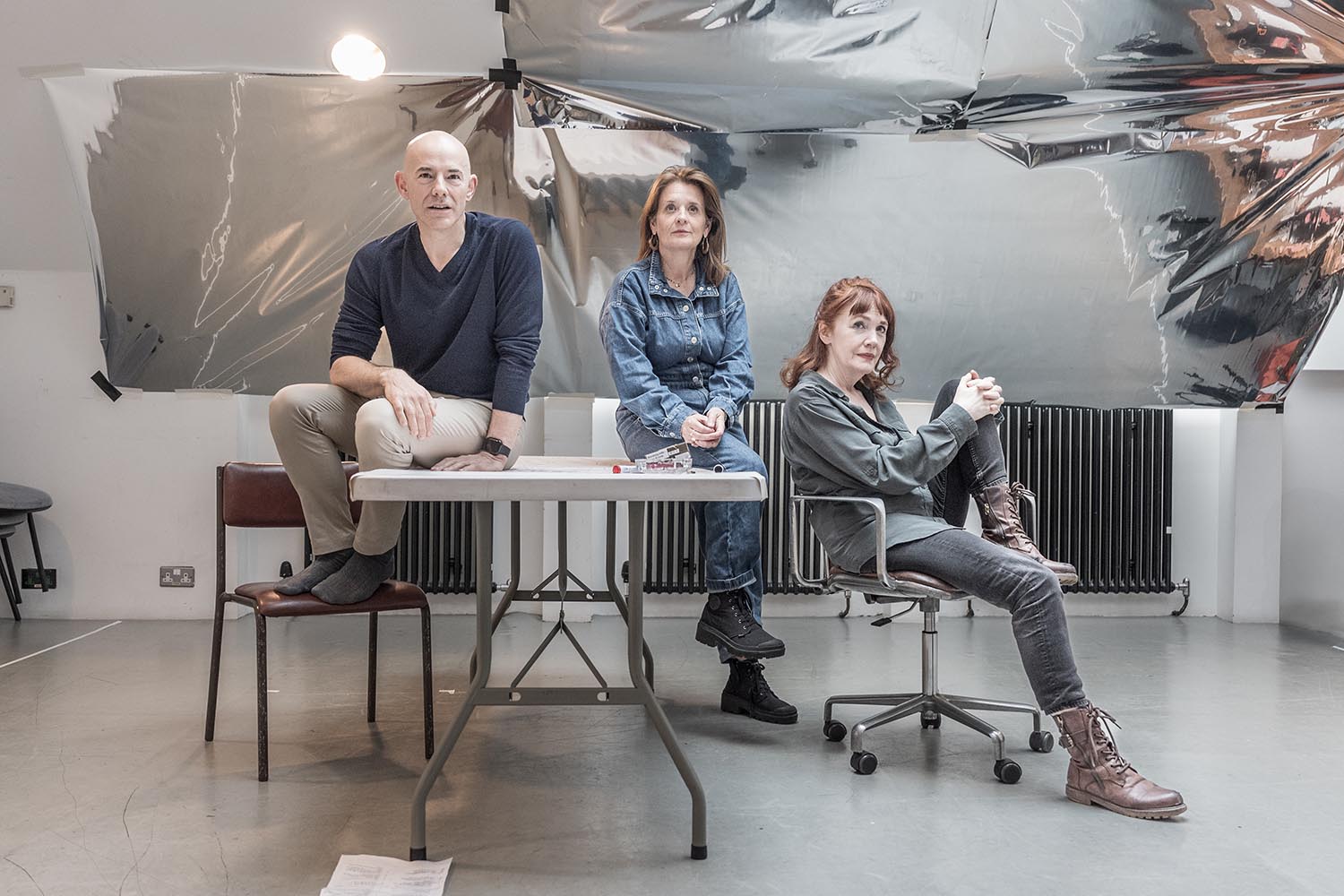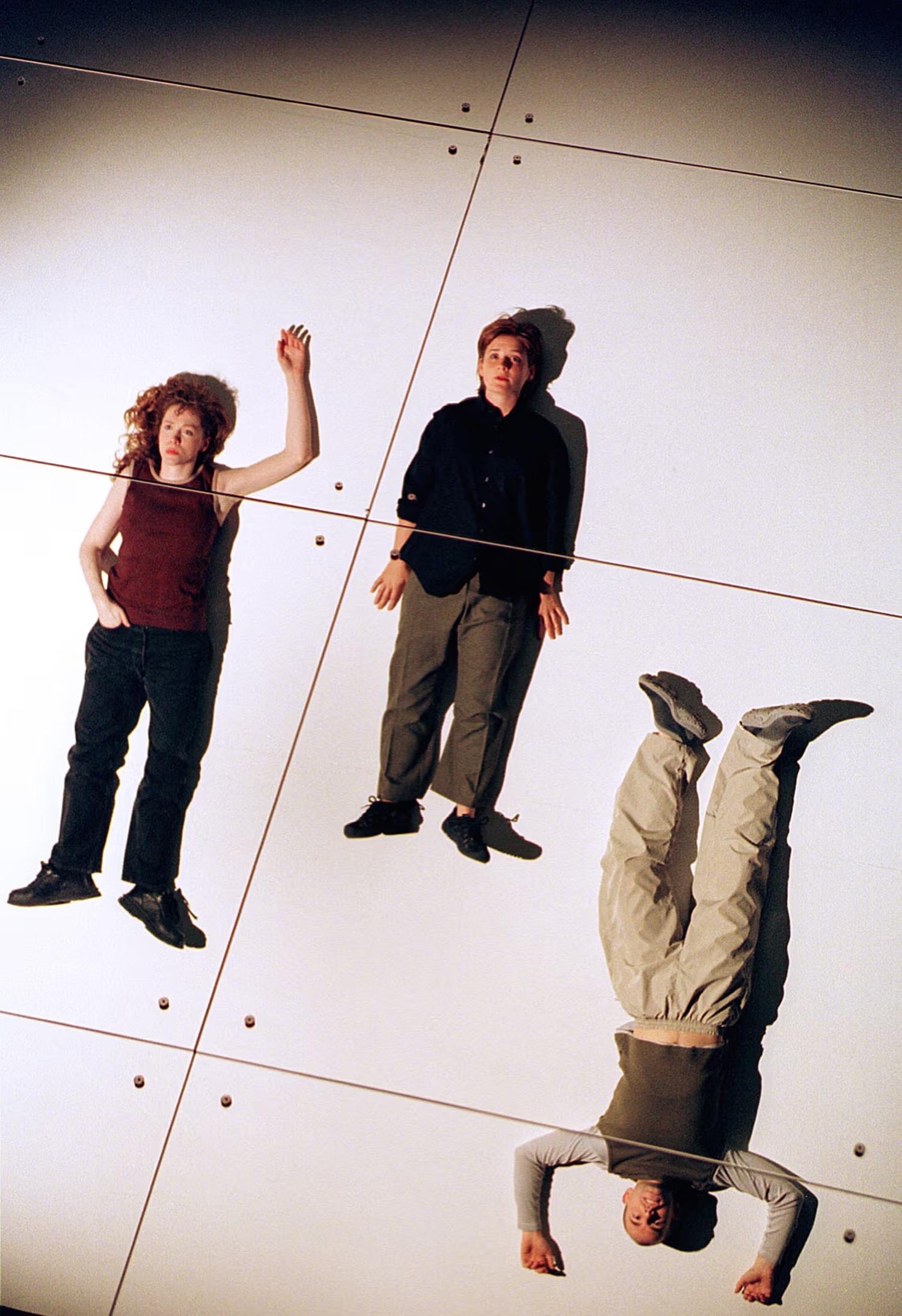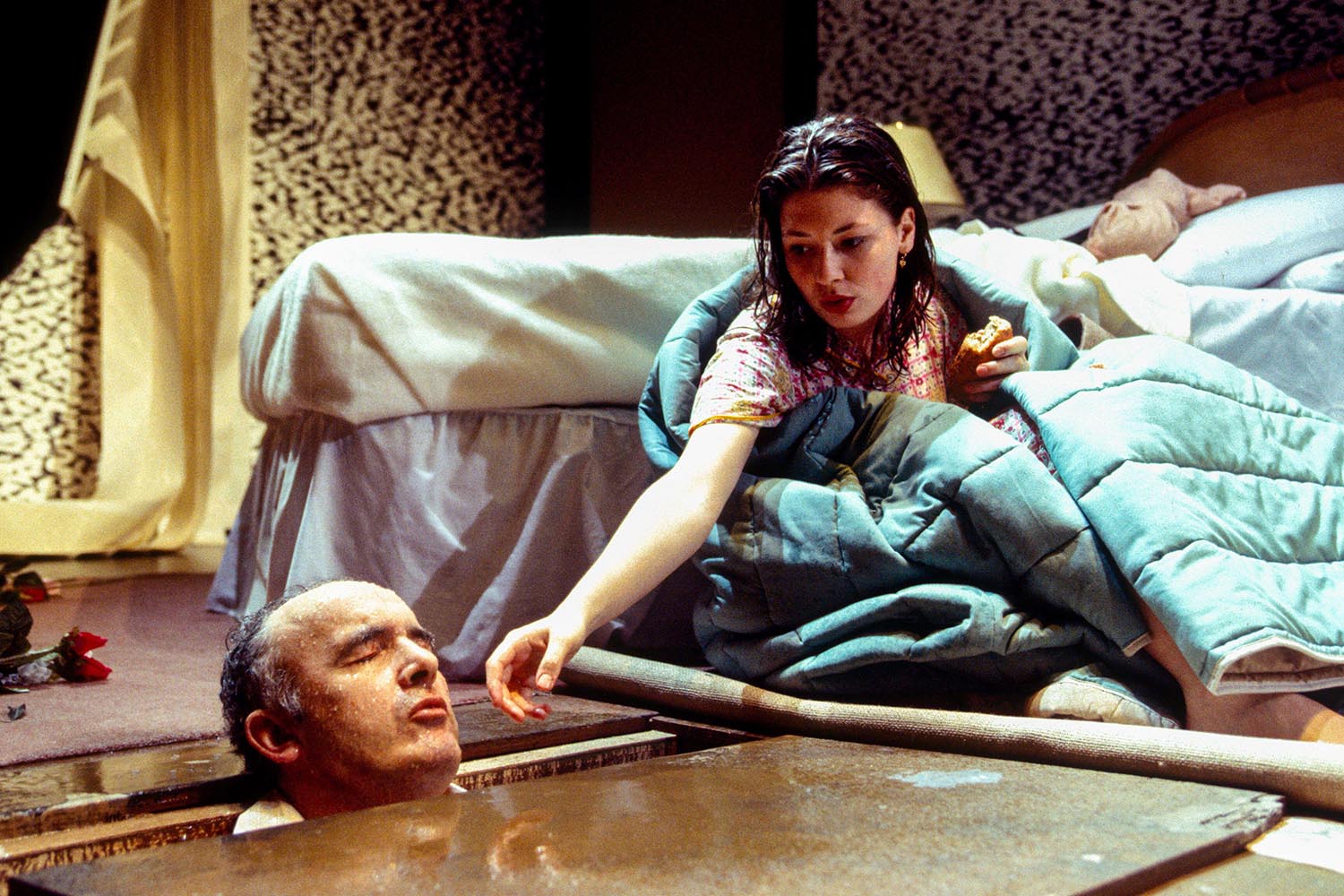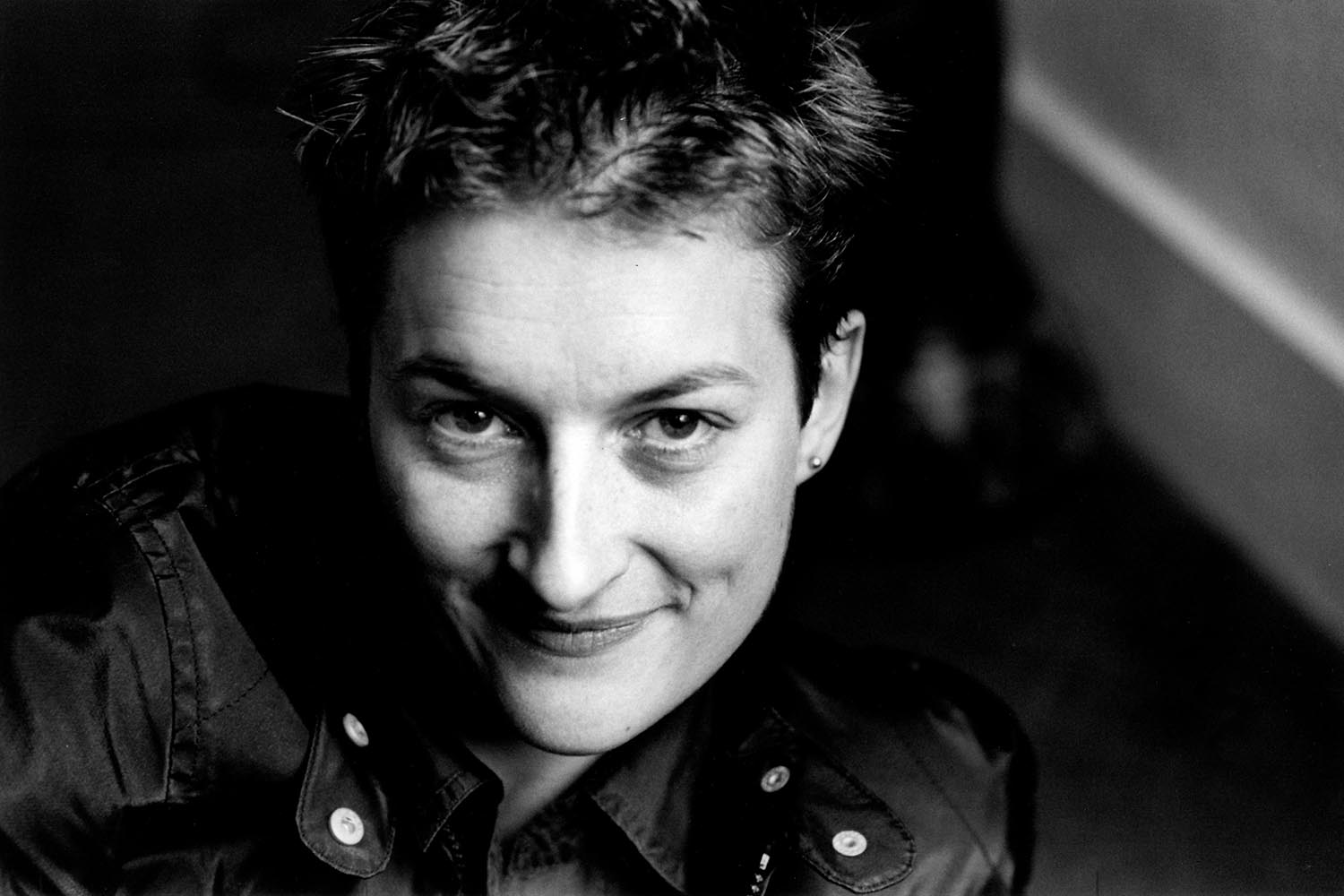Portrait by Jane Bown
In the summer of 2000, upstairs at the Royal Court, I saw a play, and even now, 25 years later, I can remember it. There were enormous mirrors that revealed the action and reflected the audience. Three actors that somehow seemed to be a single consciousness. The sense of a sleepless night, a moment of bleak clarity; a new day coming, and with it, an inevitable but devastating end.
The play was 4.48 Psychosis, and I was very moved by it; wrung out, actually, when it was done. It was a beautiful and serious piece of work, clearly concerned with depression. Its writer, Sarah Kane, had killed herself a year and a half previously.
During the second half of the 1990s, Kane blazed across the British theatre scene like a comet, creating and releasing plays in the way the Beatles did albums, each light years ahead of the previous one. 4.48 Psychosis was Kane’s fifth play – her first was Blasted, which premiered in 1995 – and her last. She died in 1999, when she was 28.
Over the years, as Sarah Kane’s star has continued to rise, that first staging of 4.48 Psychosis has become legendary. You had to be there; you can’t watch an online bootleg. Which makes it exciting that, 25 years after I saw it, the play is back at the Royal Court, before it moves to the RSC. And this is no ordinary quarter-century anniversary production. It’s being made with the same actors – Jo McInnes, Madeleine Potter, Daniel Evans – and director, James Macdonald, as the original. Only, of course, everyone is 25 years older.
“Mental health is more freely discussed among young people, but it’s not the preserve of youth,” says Mel Kenyon, Kane’s agent, when I speak to her about the Royal Court’s restaging. “Depression doesn’t go away. You don’t wake up at the age of 32 and, bang, you’re OK. Think of Hemingway and Rothko: these men survived into their 60s, then still killed themselves. 4.48 isn’t a cry for help of a twentysomething, but an exploration of the courage it takes to live with chemical instability.”
“It’s not a suicide note,” says Simon, Sarah’s older brother, who manages her estate. “I also think there’s something interesting that comes when you’re our age … Just the realisation that you don’t have much time left to change things. You might be depressed when you’re 25, but you also think you’ve got for ever to turn things around.”
Kenyon: “There’s very little empathy for somebody who is palpably not coping in their forties and fifties, because you’re supposed to have sorted it out by then.”
Related articles:

Daniel Evans, Jo McInnes and Madeleine Potter are reprising their roles in 4.48 Psychosis 25 years on
This might sound like a glum conversation, but it’s not. Simon and Kenyon are talking to me on a hot day on a high balcony at the back of the Royal Court. Simon is funny and perceptive, with the Essex accent of his youth. Kenyon, also funny, also perceptive, has a sharp haircut and cool trousers. She signed Kane up on the strength of the first half of Blasted, which she saw when Kane was a student.
Because he manages Kane’s estate, Simon decides who can stage her plays, even this version. He was cautious – “I didn’t want it to be like a band getting back together and chugging through the old hits” – but was fine once he’d seen the read-through. He admits to having been “very interfering and prescriptive and bossy” about productions of his sister’s work, but now her writing is recognised, he’s not so protective: “It’s unlikely there’ll be a production where people say, ‘What a terrible play.’ They’ll just think it’s a bad production.”
Newsletters
Choose the newsletters you want to receive
View more
For information about how The Observer protects your data, read our Privacy Policy
Simon’s initial worries were rooted in reality, because Blasted was given a thorough kicking by theatre critics; reviews so vitriolic that they became legendary. It is a tough watch: it explores how casual male violence is linked to war atrocities, and features rape and eyes being sucked out and a baby being eaten. It’s not The Lion King, but it’s also not, as Jack Tinker in the Daily Mail put it, “a disgusting feast of filth”. The Mail actually put Tinker’s review on the front page (19 January 1995 was clearly a slow news day), and other papers joined in too, deeming the play “devoid of intellectual and artistic merit” and “a systematic trawl through the deepest pits of human degradation”. Even the Guardian’s Michael Billington called it “naive tosh” (he recanted soon after). The universal disdain seemed especially nasty because Blasted was a tiny debut production, with only 62 seats available in the audience. For press night, 45 of those were taken up by critics, almost all male. Simon and Kenyon think this was part of the problem.
“They were like, why is a young girl writing plays like this?” says Simon. “They were shocked by that.”
“Do you remember Killer Joe by Tracy Letts?” says Kenyon. “It was on at the same time and they gave it rave reviews. They tore Blasted to shreds but they loved Killer Joe, which is actually [about] a girl who’s been raped falling in love with her rapist. I just thought, “This is an extraordinary, tragic irony, because you’re actually endorsing the very thing that Sarah is pointing to: ‘Look what you do to us.’”
The critical contempt very nearly stopped Kane from writing (she was only 23) but other writers – and other countries – came to her rescue. German and Belgian audiences loved her work, and Edward Bond and Harold Pinter stood up for it. Kane herself pointed out how the reviews were wrong. She wasn’t trying to shock for no reason: “Take the glamour out of violence and it becomes utterly repulsive. Would people seriously prefer it if the violence was appealing?”
By the time she died, the critics had mostly U-turned and, tellingly, audiences and actors were huge fans. Blasted was only on for three weeks and it was a sell-out; the 4.48 Psychosis I saw was too. These days, Kane’s work is part of drama A-levels; Wikipedia lists 24 important productions of 4.48; and YouTube has pages and pages of young actors giving Kane monologues. Kane’s central themes, of how loving humans can be, as well as how terrible, can be stomach-churning, but she’s also very funny. The first words in Blasted are: “I’ve shat in better places than this.” (Kenyon has this line on a plaque on a bench in her garden.) And in 4.48 Psychosis, there’s a bit that makes me bark every time. Someone asks: “Have you made any plans?” And the reply is: “Take an overdose, slash my wrists, then hang myself.” All those things together? “It couldn’t possibly be misconstrued as a cry for help.”

‘It’s not like you hit 32 and, bang, depression goes away’: the cast in the 2000 staging
If you read 4.48, and I recommend you do, what strikes you is its lack of “play-ness”. It’s more like a poem, 24 short sections with carefully spaced gaps, no stage directions, no explanations, no exposition. One section is a series of numbers dotted across the page. It’s clearly partly about the medical treatment of depression: you get the idea of forms filled in, of tried and failed prescriptions, of talking therapy, as well as burning love and depthless despair. But there’s no indication of how many actors are needed, of what the stage should look like, of who says what and when.
When it was first staged, the young actors, Evans, McInnes and Potter, found this thrilling, as they do now. They were giddy with the excitement of it – “it felt punk” – though occasionally they had to go home early from rehearsals because things got too intense.
I’m speaking to them in an office in a different part of the Royal Court, alongside director Macdonald. Back in 2000, Macdonald had to work out how many actors 4.48 needed. He’s quite attached to three now – he took his cue from a line that says “Victim. Perpetrator. Bystander” – but originally did workshops with about a dozen actors, and has seen productions with just one.
When the team returned to 4.48, they “just set off”, he says. The actors found they remembered a lot, including one section of the play where they’ve never allocated the lines. “It’s a multiple voice bit,” says Potter. “And it’s different every time.” They’re clearly delighted to be doing it, although, they point out, it’s still not easy: “You can’t get in the way of the play.”
This is the sort of stuff all theatre actors say (MacDonald recalls that one of Kane’s favourite jokes was: “How many playwrights does it take to change a lightbulb?” Answer, huffily: “It doesn’t need changing, all right!?”), but with this play, you understand it. The words, the spaces, are so carefully edited. Kane was exact. Evans was once in a rehearsal with her (for Cleansed, her third play) and she triumphantly announced she’d made a change to the script: “It was turning a comma into a full stop. But it completely changed the meaning of the line.”
Kane’s words are unalterable, but the actors have found that, for them, the meaning held within those words has changed. During the rehearsals in 2000, they had to talk to outsiders about depression, and researched lines about gender dysphoria. This time around, says Daniel, “we have to reach less”.
Potter: “Yes, you’ve got to turn up and go to all the dark places, but you know where they are. And, being older, there’s the sense of the play being to do with love and the longing for that, and that feels wider, deeper, more painful.”
Evans: “There’s a strand in all of Sarah’s plays that is about wanting to connect with another person deeply, lovingly. When you’re older, you can still have that need.”
McInnes: “Yes, the understanding that to love someone else, you have to be at peace with yourself. You have to love who you are. You have to meet yourself.”
Potter: “But also it might just be that there was another person, and you were supposed to meet them, and that’s more elusive as time goes by. The cost is different.”
Being older, you know where the dark places are but the play is to do with the longing for love, and that feels wider, deeper, more painful
Being older, you know where the dark places are but the play is to do with the longing for love, and that feels wider, deeper, more painful
When Kane died, she left notes for people, including Simon and Kenyon, with instructions as to what she wanted to happen with her work, such as not to let her plays be made into films and to refuse an authorised biography. She insisted on her life and work being separate, and this has meant that Simon now thinks of his sister “almost as two different people”.
“There’s Sarah, and there’s Sarah Kane the playwright,” he says. “I feel no obligation to tell the world about Sarah. She wanted people to focus on her work, not on her life. She stipulated: no biographies, no letters, ask my friends not to publish any personal pieces about me. She went through all her papers and poetry and diaries and destroyed them. She was clear.”
During her working life, Kane did a few interviews. She was a fan of indie music and of Manchester United, a team in its pomp in the mid-1990s. Linked to this, she preferred theatre when it was a “performance”, finding it “much more interesting than acting”. She said: “I hate the idea of theatre just being an evening pastime. It should be emotionally and intellectually demanding. I love football. The level of analysis that you listen to on the terraces is astonishing. If people did that in the theatre ... but they don’t. They expect to sit back and not participate.” And: “I saw the Jesus and Mary Chain … and found myself longing for a theatre that could speak so directly to an audience’s experience.”
She lived in Brixton, near the Academy, and liked going to gigs, saving her writing for late at night.
“Judging by the last six months of her life,” says Simon, “when she used to ring me up at three o’clock in the morning, I think she just used to write and write and write and write, in the dark, in longhand.”
Two elements of Kane’s past are often seized upon as significant. The first is that her father Peter “worked on Fleet Street” – he was the Daily Mirror’s “area man” for East Anglia, which meant he chased stories in the region – and one of the protagonists in Blasted is a cynical middle-aged tabloid hack. (Simon: “Sarah and I both grew up with a distrust of journalists asking questions.”) The second is that Simon and Sarah were brought up as Christians. Simon has said that, as a girl, Sarah was the most fervent believer of the family. Do they get a sense of faith from her plays?
Kenyon: “She said to me, ‘I knew God when I was young’. I think she carried that with her, the notion that there might be something out there, not a man with a beard, but something greater than us…”
Simon: “I’m not sure I agree. With Sarah, sometimes she seemed to think there was a God; sometimes she didn’t. I think by the end, she thought that God was probably a malevolent torturer, rather than a creator, and that terrified her.”
Maybe she was too clear-eyed to be an optimist. Kenyon: “There are times when those who are deemed mentally unwell have such clarity of vision and thought that it’s terrifying to the rest of us. None of us want to look over the edge into the abyss, and some people who do just don’t come back. Sometimes I think Sarah ripped down the veil and saw exactly what was behind it, and that is unlivable with.”

Pip Donaghy and Kate Ashfield in Blasted, Kane’s first play, in 1995
Kane’s suicide was preventable, in that the staff at King’s College hospital, where she was being treated, made mistakes: an inquest into her death found that notes were passed on and she wasn’t watched as she should have been. And, also, it wasn’t. Over the years, Kane took the drugs psychiatrists prescribed, did the talking therapy, but nothing seemed to work for her. “She knew that everybody was struggling to do their very best,” says Kenyon. “It’s just that the tools are negligible, whether medical or emotional, or psychological.”
For those close to her, Kane’s life changed everything, as did her death. Simon worked in finance until she died, hating it but earning a lot of money; he found himself unable to cope once Sarah was gone.
“It was a big wake-up call,” he says. “I was in work, about six months after she’d died, and somebody made a comment. And I completely went off on him, stormed out of the office and went stomping around the town, talking to myself and getting angry. And I realised: if I don’t have some time off, I’m going to have a breakdown.”
He never went back. His work, ever since, has been looking after Kane’s plays. Until now.
“This production, for me, feels like a bookend,” he says. “I’m not saying I’m going to stop looking after Sarah’s work, because that’s not the case, but it does feel very symbolic, significant in ways I can’t quite put into words. Like some sort of ending, and I don’t really know what that’s going to mean.”
Perhaps seeing the play will help.
“Yes, because it’s such a generous play,” says Kenyon. “It helps everyone. Sarah’s act of creation when she was suffering, the generosity in eviscerating herself to write out her experience in poetic form, to tell the world what it’s really like, both internally and externally, from the outside and the inside. I think only a great artist is able to do that while simultaneously having the experience of huge distress.”
“It’s not a lecture,” says Simon. “Not, ‘here are a series of scenes that show what this experience is – sit over there and watch it, and you might learn something.’ It’s not that at all. I mean, I’m still, to some extent, puzzling over the words, after 25 years. But the first time I saw it, I understood the feeling. I got it. Everyone does.”
4.48 Psychosis is on at the Jerwood Theatre Upstairs, Royal Court, from 12 June to 5 July and at the RSC’s the Other Place from 10 to 27 July.
For free confidential support, contact the Samaritans on 116 123 or email jo@samaritans.org
Photographs by Marc Brenner, Tristram Kenton, Donald Cooper/Alamy



